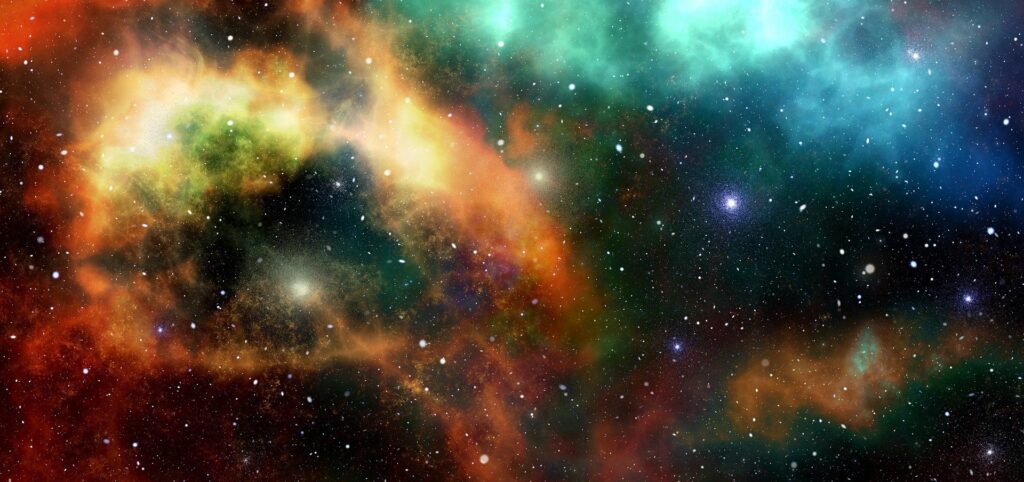Astronomy studies stars, planets, and galaxies, observing their properties and movements in space. It explores phenomena like supernovae and black holes.
Cosmology, on the other hand, focuses on broader questions about the origin, evolution, and structure of the entire universe. It investigates the universe’s big-picture aspects, such as its age, size, and composition, as well as the fundamental forces and laws that govern it.
While astronomy examines individual celestial objects, cosmology looks at the universe as a whole, aiming to uncover its mysteries and our role within it.
This article will talk about astronomy and cosmology, explaining what they are and what makes them different. We’ll also learn why it’s important to know the difference between them and how they help us learn about space.
What is Astronomy?

Astronomy is the scientific study of celestial objects, including stars, planets, galaxies, and other phenomena beyond Earth’s atmosphere. It encompasses a wide range of disciplines, such as observational astronomy, theoretical astrophysics, and planetary science.
Astronomy seeks to understand the properties, behavior, and evolution of these celestial bodies through observation, experimentation, and mathematical modeling.
Scope of Astronomy:
Astronomy is huge! It’s all about studying different things in space, like stars, planets, galaxies, and even bigger stuff like galaxy clusters. We learn about what these things are made of and how they move around in space.
Astronomy also explores phenomena such as supernovae, black holes, and cosmic radiation, as well as the formation and evolution of the universe itself.
Examples of astronomical studies and discoveries
Exoplanets
Astronomers have discovered thousands of exoplanets orbiting stars outside our solar system, leading to insights into planetary formation and the potential for habitable worlds beyond Earth.
Black Holes
Observations of black holes, regions of spacetime where gravity is so strong that nothing, not even light, can escape, have provided evidence for the existence of these enigmatic objects predicted by Einstein’s theory of general relativity.
Cosmic Microwave Background Radiation
The discovery of the cosmic microwave background radiation, a remnant of the Big Bang, has provided crucial evidence supporting the Big Bang theory and our understanding of the universe’s origins.
Gravitational Waves
The detection of gravitational waves, ripples in spacetime caused by cataclysmic events such as the collision of black holes, has opened a new window to the universe, allowing scientists to study phenomena previously inaccessible through traditional telescopes.
What is Cosmology?

Cosmology is the scientific study of the origin, evolution, and large-scale structure of the universe as a whole. It seeks to understand fundamental questions about the universe’s composition, dynamics, and ultimate fate, as well as the underlying physical laws and principles governing its behavior.
Scope of Cosmology
Cosmology is a big field that covers lots of stuff about the universe, like how it started and what it’s made of. One important idea in cosmology is the Big Bang theory, which says the universe began as a really hot and packed place about 13.8 billion years ago, and it’s been getting bigger ever since.
Cosmology also explores the formation and distribution of galaxies, the nature of dark matter and dark energy, and the cosmic microwave background radiation, among other subjects.
Additionally, cosmology investigates theoretical concepts such as multiverse theories, inflationary models, and the nature of spacetime itself.
Examples of cosmological theories and concepts
Big Bang Theory
The prevailing cosmological model, the Big Bang theory, suggests that the universe originated from a singular point of infinite density and temperature, known as a singularity. This event marked the beginning of spacetime and initiated the expansion of the universe, leading to the formation of matter, radiation, and eventually galaxies and stars.
Inflationary Cosmology
The inflationary theory says that right after the Big Bang, the universe grew super fast for a short time. This helped solve some puzzles about how the universe looks today, like why it seems the same in every direction and why it’s so flat. It also explains why the background radiation from the Big Bang is spread out evenly.
Dark Matter and Dark Energy
Cosmologists study the mysterious components of the universe known as dark matter and dark energy, which together comprise the majority of the universe’s mass-energy content.
Dark matter is hypothesized to be an invisible form of matter that exerts gravitational effects on visible matter, while dark energy is believed to be a repulsive force driving the accelerated expansion of the universe.
Multiverse Theories
Some cosmological models propose the existence of a multiverse, a hypothetical ensemble of multiple universes with varying properties and physical constants. Multiverse theories arise from concepts in quantum mechanics and string theory and suggest that our universe may be just one among many parallel realities.
Key Differences Between Astronomy and Cosmology

Focus and Objectives
Astronomy primarily focuses on studying individual celestial objects, such as stars, planets, galaxies, and nebulae, as well as their properties, movements, and interactions. Its objectives include understanding the composition, structure, and evolution of these objects, as well as their roles in shaping the universe.
On the other hand, cosmology has a broader focus, investigating the universe as a whole and addressing fundamental questions about its origin, structure, and dynamics. Its objectives include determining the overall geometry and fate of the universe, as well as elucidating the nature of dark matter, dark energy, and other cosmic phenomena on a large scale.
Methods and Approaches
Astronomy employs observational techniques, such as telescopic observations, spectroscopy, and imaging, to collect data on celestial objects and phenomena. Astronomers analyze this data using mathematical models, computer simulations, and theoretical frameworks to uncover patterns, trends, and relationships in the cosmos.
In contrast, cosmology often relies on theoretical models, mathematical equations, and computational simulations to study the universe’s large-scale properties and evolution.
Cosmologists use observational data from astronomical surveys, cosmic microwave background radiation measurements, and other sources to test and refine their theories and hypotheses about the universe’s structure and history.
Relationship to other fields of science
Astronomy has interdisciplinary connections with various fields of science, including physics, chemistry, geology, and biology. It integrates principles and methodologies from these disciplines to explore phenomena such as stellar evolution, planetary geology, and astrobiology, contributing to our understanding of the universe’s complexity and diversity.
Similarly, cosmology intersects with multiple branches of science, including theoretical physics, particle physics, and quantum mechanics. It draws on concepts from these fields to develop models of the early universe, the formation of cosmic structures, and the behavior of dark matter and dark energy, shedding light on the universe’s fundamental properties and mechanisms.
FAQ
Who is the father of cosmology?
Ancient Greek philosopher Anaximander is often called the father of cosmology because he came up with one of the first ideas about how the universe works.
What is God in cosmology?
In cosmology, “God” usually means a divine or supernatural being people talk about when discussing how the universe began and what it’s like. But in science, we focus on natural explanations without involving God.
Is astronomy part of cosmology?
Yes, astronomy is like a smaller part of cosmology. Astronomy studies stars, planets, and galaxies, while cosmology looks at the whole universe, including where it came from and how it’s changing.
Is cosmogony part of cosmology?
Yes, cosmogony is an important part of cosmology. It’s all about understanding how the universe started and how everything in it, like stars and planets, formed over time.
What are the three types of cosmology?
The three main types are
- Physical Cosmology: Looks at the big picture of the universe, like its shape and how it’s growing.
- Observational Cosmology: Uses telescopes and other tools to study the universe and gather information.
- Theoretical Cosmology: Makes up theories and uses math to explain how the universe works and predict what might happen.
Final thoughts
Astronomy and cosmology both look at space, but in different ways. Astronomy zooms in on specific things like stars and planets, while cosmology looks at the universe as a whole. Knowing these differences helps us see how big and varied space science really is.
